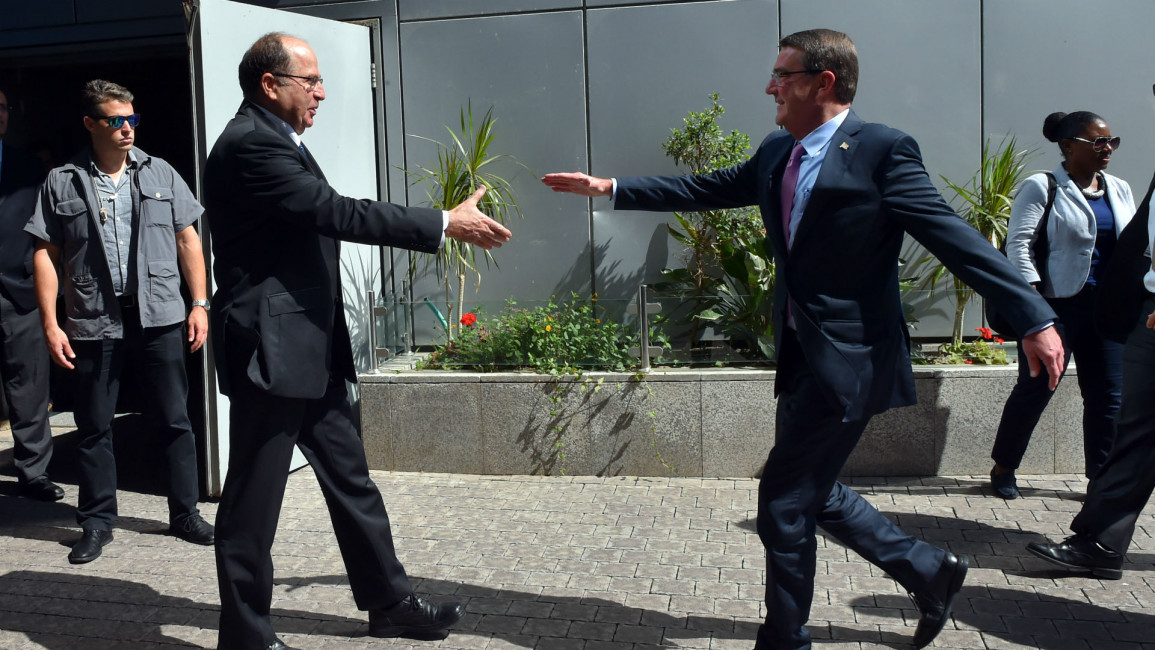US official: Military action against Iran 'still an option'
US official: Military action against Iran 'still an option'
In a move intended to assuage Israeli fears over the Iran nuclear deal, the US defence secretary said military action against Iran was still a possibility.
2 min read
Yaalon (L) greets Carter (R) in Tel Aviv [Getty]
US Secretary of Defense Ashton Carter has announced to journalists accompanying him on his trip to Israel that the military option against Iran was still on the table.
Carter's revelation was a response to Israeli Prime Minister Binyamin Netanyahu's campaign against the nuclear agreement with Iran, said Haaretz. Carter, who arrived in Tel Aviv yesterday, added he would not try to change Israel's position on the deal with Iran.
Though Carter is accompanied on his trip by General Martin Dempsey, the chairman of the Joint Chiefs of Staff, he will not offer a military aid package to Israel as a sweetener for the deal, contrary to previous reports.
Netanyahu announced he would put his position on the deal to the US Congress, which has still to issue its final decision on the ratification of the deal.
It has 60 days to do so from the time it receives an official copy of the agreement.
In the meantime, Netanyahu will continue to criticise the deal in the media - ostensibly for "endangering Israel's security".
Israeli sources mentioned a few weeks ago that Israel's Ministry of Defence and its chiefs of staff delayed negotiations on US military-security assistance to Israel until the details of the agreement could be reviewed.
The most recent military-security agreement between Israel and the US was agreed under former Israeli Prime Minister Ehud Olmert, and is due to end in 2017.
Carter will meet with Netanyahu and Minster of Defense Moshe Yaalon while in Tel Aviv.
In an interview with ABC yesterday, Netanyahu said he would tell Carter during their meeting that the US should not sign the agreement.
The US should insist on a better deal, he said.
Israeli Channel Ten revealed yesterday the Israeli lobby AIPAC had launched a media campaign in the US against the nuclear deal.
The channel said AIPAC had devoted $20 million to pressuring the members of the US Congress to vote against ratifying the deal.
Carter's revelation was a response to Israeli Prime Minister Binyamin Netanyahu's campaign against the nuclear agreement with Iran, said Haaretz. Carter, who arrived in Tel Aviv yesterday, added he would not try to change Israel's position on the deal with Iran.
Though Carter is accompanied on his trip by General Martin Dempsey, the chairman of the Joint Chiefs of Staff, he will not offer a military aid package to Israel as a sweetener for the deal, contrary to previous reports.
| Netanyahu will continue to criticise the deal in the media for endangering Israel's security. |
It has 60 days to do so from the time it receives an official copy of the agreement.
In the meantime, Netanyahu will continue to criticise the deal in the media - ostensibly for "endangering Israel's security".
Israeli sources mentioned a few weeks ago that Israel's Ministry of Defence and its chiefs of staff delayed negotiations on US military-security assistance to Israel until the details of the agreement could be reviewed.
The most recent military-security agreement between Israel and the US was agreed under former Israeli Prime Minister Ehud Olmert, and is due to end in 2017.
Carter will meet with Netanyahu and Minster of Defense Moshe Yaalon while in Tel Aviv.
In an interview with ABC yesterday, Netanyahu said he would tell Carter during their meeting that the US should not sign the agreement.
The US should insist on a better deal, he said.
Israeli Channel Ten revealed yesterday the Israeli lobby AIPAC had launched a media campaign in the US against the nuclear deal.
The channel said AIPAC had devoted $20 million to pressuring the members of the US Congress to vote against ratifying the deal.


![President Pezeshkian has denounced Israel's attacks on Lebanon [Getty]](/sites/default/files/styles/image_684x385/public/2173482924.jpeg?h=a5f2f23a&itok=q3evVtko)



 Follow the Middle East's top stories in English at The New Arab on Google News
Follow the Middle East's top stories in English at The New Arab on Google News


